Reports of new Formula 1 races planned in Vietnam and The Netherlands point to good news for Liberty Media ahead of an important call with investors.
But in a move which spells trouble for F1’s owners, a growing group of F1 venues seeking cut-price deals have re-formed their alliance.
Expect a slew of feel-good messages from Formula One’s commercial rights holder Liberty Media over the next week given that two key dates loom: as stated here at 11:00 EST, 8 November the company will reveal its Q3 2018 results, with its Investor Meeting, during which a number of backward- and forward-looking statements about the financial health of F1 will be made, slated for 09:00, 14 November.
The latter is obviously the biggie given that stakeholders and analysts will assemble in the same room as Liberty executives, and thus be able to question on them on reasons for share prices that have bounced and bounded between $30 and $39 over the past 180 days, while no significant announcements or advances have (yet) been made on key performance areas such as new venues, OTT streaming or new corporate sponsors.Even the most detached investors (forget not that investors view Liberty’s FWONA and FWONK trackers purely as investment vehicles, not as sport properties) cannot fail to have noticed that F1’s current covenants and regulations expire on 31 December 2020, and that little or no tangible progress has made on crucial issues such as sporting/technical regulations, budget caps, revenue distribution and governance.
Indeed, one hears the shadow of Bernie Ecclestone looms large over such talks, for after his ousting he likely has more than a few scores to settle. He can call on loyalty amongst race promoters, team bosses, sponsors and tech partners, plus staff members who formerly worked under him and remain on the Formula One Group’s payroll. He, after all, created many millionaires among them during his reign, and they owe him.
It is a given that ‘resetting’ F1 always was going to be a difficult task, even without opposition. Particularly for a group of folk with no in-depth knowledge of the business of F1. Liberty’s roots are in entertainment, yet in F1 the company is not the entertainer but a (secondary) entertainment facilitator. The teams and circuits could collectively stage a grand prix championship, but Liberty could not do so without them.
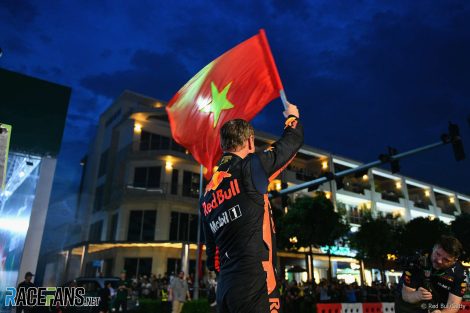
Liberty had the sagacity to sign up Ross Brawn, who guided Ferrari, Benetton and his eponymous team to multiple titles, as motorsport chief. He in turn employed a large group of professionals to unravel F1’s multi-layered complexities, but there is still only so much any group can achieve when ranged against ten teams and/or 21 race promoters – with their strength in depth and breadth to protect entrenched positions.
Hence slow (visible) progress over the past two years, and thus the significance of investor activity scheduled for this Thursday and Wednesday next. Time for good news: Today FOM duly announced the Vietnamese Grand Prix will join the calendar in 2020.
Intriguingly Channel News Asia previously reported that inviations for today’s gala where the circuit will be unveiled stated: “The city of Hanoi managed to conclude the cooperation to be entitled as the official host of a race of the FIA Formula 1 World Championship (from) April 2020.”
However, the channel added authorities earlier said that while the city of Hanoi supported the idea of hosting a race, they would not dip into government coffers. “The prime minister said if Hanoi hosts (a race), the budget should be from the private sector,” Mai Tien Dung, head of the government office, was quoted saying in August.
Advert | Become a RaceFans supporter and
Although Hanoi is the first new event Liberty has added to the F1 calendar it is not Liberty’s first signing per se. Spa-Francorchamps, Suzuka and Hockenheim renewed contracts during the past 12 months (the latter, however, only for a single year), although Wallonia’s Economy Minister Pierre-Yves Jeholet described Spa’s renewal as “a good deal” while urging the promoter “to further trim costs”.
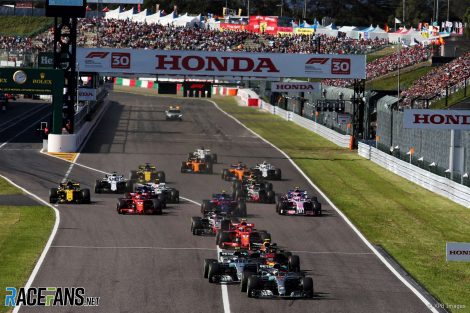
Now, though, consider a forward-facing facing question from a sharp investor: “What contracts are due to expire next year?”
According to our information the contracts of Catalunya, Silverstone, Hockenheim (see above), Monza and Mexico all run out next year, with Abu Dhabi’s current contractual situation unclear. That makes for minimum five, possibly six, looming renewals – or around double 2018’s renewal tally.
Add in that Hockenheim cut a one-deal after receiving commercial support from its local motor manufacturer. What about the future; will the Three Pointed Star come back for more, particularly given that the renewal window coincides with a changing of the guard, with current CEO Dieter Zetsche stepping aside to be replaced by Olla Källenius, a hybrid vehicle-loving Swede.
Does it sound as though a German Grand Prix will be a priority? Will F1 even be a priority for Källenius? Parent company Daimler’s share price lost a quarter of its value this year and investors are pushing for radical changes, while in the US the Mercedes C Class is currently outsold by Tesla’s Model 3 despite the latter’s well-documented quality and production shortcomings.
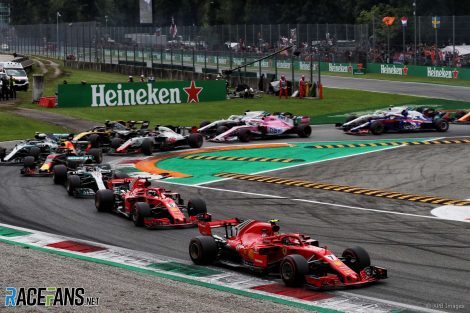
Would Ferrari underwrite a race it has just got itself beaten on? Well, the Rampant Stallion recently missed its 2018 Q3 targets and it too is getting to grips with life post-Marchionne: replacement Louis C Camilleri, a former Marlboro Man, is still finding his way about Maranello. And the company’s planned 2022 move into the lucrative luxury SUV market with the Purosangue will surely vacuum up Ferrari’s petty cash.
Of course, none of these factors point to definite ‘Neins’ from Germany or ‘Nos’ from Italy, but do indicate the scale of challenges lying ahead as race contracts expire. Renewals in both Hispanic-speaking regions, Spain and Mexico, are likely to be equally complex, for both countries are currently in the midst of political upheaval – the former due to Catalan secession demands; the latter due to a landslide leftist swing.
Advert | Become a RaceFans supporter and
The Mexican Grand Prix enjoys significant government state funding – the word in the paddock was that state coffers underwrite the hosting fee under a five-year deal expiring in 2019, with promoter costs covered by gate income – but that could change after next year’s race, the first staged under the incoming administration of president-elect Andres Manuel Lopez Obrador, who takes office next month.
While the situation in Spain the situation is less complex than a year ago – when the region fell directly under central government rule after a short-lived unilateral independence declaration – the fact remains that the Catalan administration is considering its priorities, all of which dent regional coffers. MotoGP is clearly more popular than F1, and with Fernando Alonso retiring, does Carlos Sainz offer sufficient box office appeal?
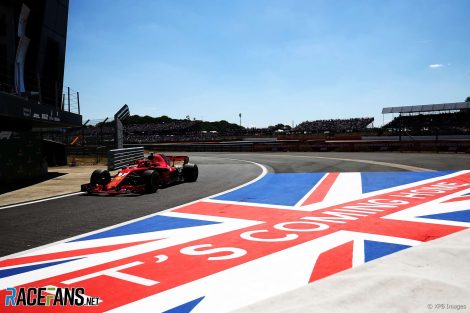
Which leaves Silverstone and (possibly) Abu Dhabi: Let’s deal with last-named first: Should Yas Marina’s contract be up for renewal, it is likely to present no difficulty for, if anything, regional pride enters into the equation. Already Bahrain is on the calendar, and while logic dictates that one grand prix suffices for what is hardly an over-populated region, the abundant availability of petro-dollars means business cases are easily made.
Then there is the question of Qatar: with a ready-made circuit already staging MotoGP and well-documented aspirations of hosting F1, neither Bahrain nor Abu Dhabi are likely to present a country they are currently embroiled in political stand-offs with, with a grand prix on a silver platter. So, Abu Dhabi represents an easy deal when (and if) the deal arises.
Not so Silverstone, which triggered its exit option for 2019 in 2017 rather than stick with an “unsustainable contract” through to 2026: “We’ve reached the tipping point where we can no longer let our passion for the sport rule our heads,” said the circuit-owning BRDC’s chairman John Grant at the time. “Put simply, it is no longer financially viable for us to deliver the British Grand Prix under the terms of our current contract.”
Clearly the ‘Home of British Motor Racing’ (and first venue to host a world championship round, in 1950) does not wish to drop F1, but equally has no wish to go under due to astronomical hosting fees. Thus Liberty faces tough alternatives: reduce Silverstone’s fee (by something like 30%/$10m), or risk the wrath of fans in its heartland (and home race for 70 per cent of teams, albeit shared in some instances).
Not an easy choice. But whoever said F1 was easy?
There is an argument that $10m represents a relative pittance on a turnover of $1.8bn, but multiply that by 21 races and the number rapidly spirals to $200m, or 50 per cent of Liberty’s share of F1’s retained revenues. Thus what it gives with one hand it must take with the other, but from where? New races?
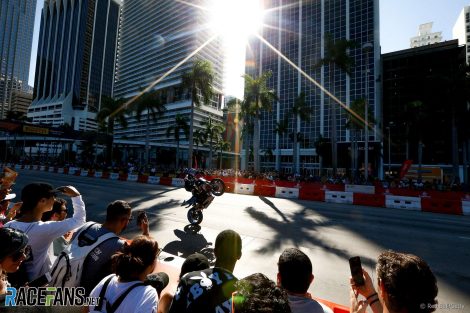
Liberty has, though, two irons in the Dutch bonfire: Zandvoort and Assen. However, contrary to reports, RaceFans understands a deal with either venue is far from dusted, with FOG currently playing them off against each other. Compounding the situation is that both require a modicum of state support – up to $10m, a number that sounds increasingly familiar – and thus any Dutch Grand Prix is very much in the hands of civil servants.
Overarching all this is the Formula One Promoters Association. Originally incorporated in Switzerland in 2012 by Ecclestone as a foil against growing team influence, FOPA was re-formed under the presidency of Silverstone CEO Stuart Pringle, with Brazilian Grand Prix promoter Tamas Rohonyi Ketesz and Singapore’s Colin Syn Wai Hung as co-board members.
Think regular team boss meetings during grand prix weekends, and apply that to promoters. Like the teams, Pringle denies vehemently that FOPA is militant, but rather a body fostering good relations and providing discussion forums for common issues amongst co-promoters, who are mainly in competition with outside entertainment options, not themselves. In a phrase: They talk to ‘spice up F1’s spectacle’, as do teams bosses.
However, whenever like-minded folk meet they are sure to discuss one thing above all others: Money.
FOPA currently counts around half the promoters as members, but has shared its information and findings amongst all peers as a gesture of goodwill, with the common thread being that they all plan to extend contracts, but not at any price. Indeed, most are seeking some form of revenue-share agreement with Liberty – which makes utter sense from a promoter perspective, if not the commercial rights holder’s…
Therein lies Liberty’s primary challenge over the next two weeks: To provide sufficient backward- and forward-looking news to keep shareholders sweet. That won’t be easy, as the past two years have proven.
Follow Dieter on Twitter: @RacingLines
Go ad-free for just £1 per month
>> Find out more and sign up
RacingLines
- The year of sprints, ‘the show’ – and rising stock: A political review of the 2021 F1 season
- The problems of perception the FIA must address after the Abu Dhabi row
- Why the budget cap could be F1’s next battleground between Mercedes and Red Bull
- Todt defied expectations as president – now he plans to “disappear” from FIA
- Sir Frank Williams: A personal appreciation of a true racer




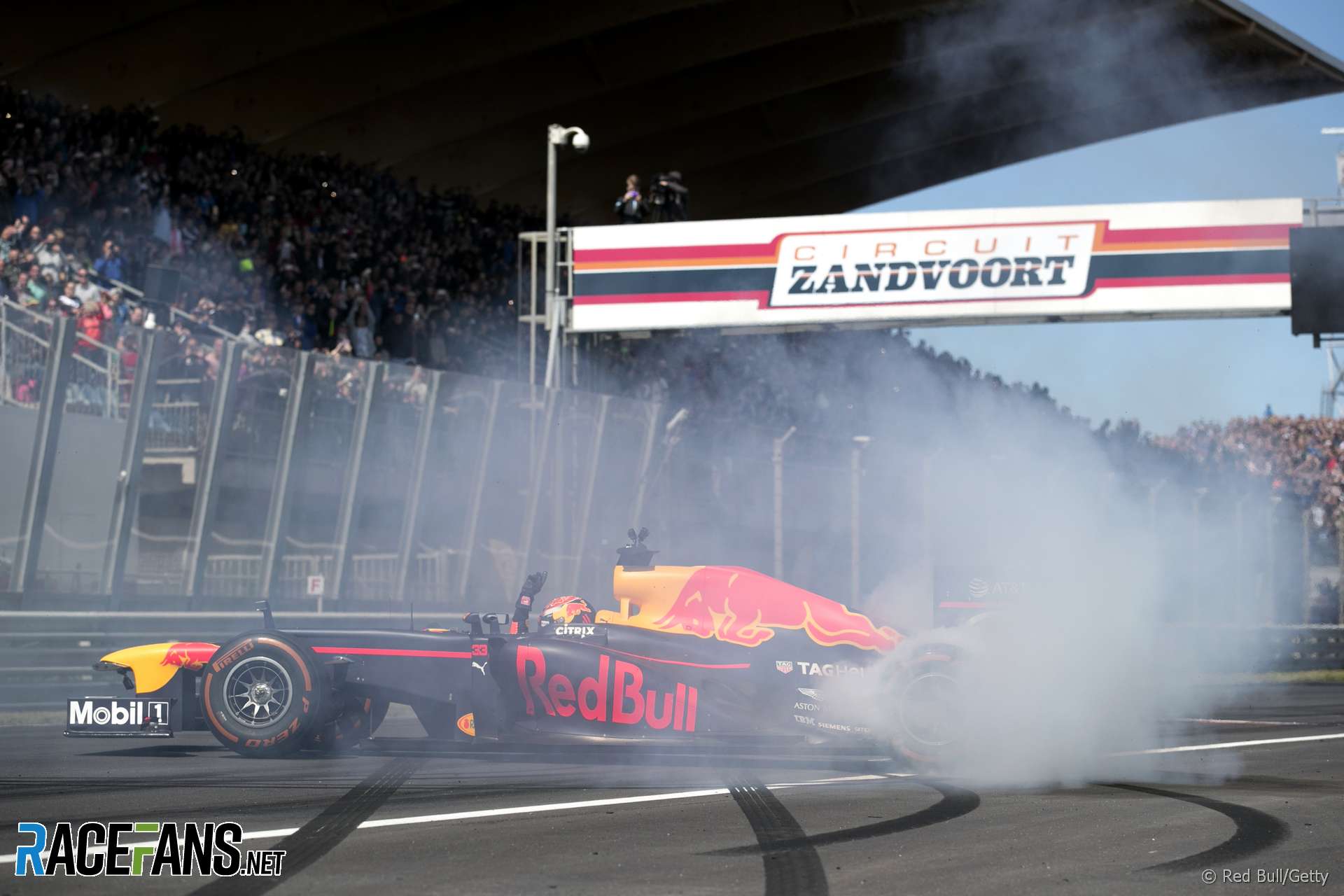
Jere (@jerejj)
7th November 2018, 13:04
Interesting and informative article.
ColdFly (@)
7th November 2018, 15:57
Agree, another great Racing Lines article.
Thinking solution. Why doesn’t Liberty and host agree to races every 2 or 3 years. I think all win.
– hosts. Easier to get the money and a race every few years is more special (Olympics, works cup football)
– liberty. More hosts to sell the product to.
– fans. More uncertainty for teams when visiting (less recent data) and thus more unpredictability.
Dieter Rencken (@dieterrencken)
7th November 2018, 16:50
Circuits need to defray the costs and that becomes difficult unless they have a big money spinner annually, as Nurburgring discovered when it was locked into the timeshare deal with Hockenheim. Hockenheim is in a different situation as it is council owned and they don’t owe money on it.
However, with street circuits it is even more critical that they have as many races as possible to recover the investment in temp stands, barriers etc.
erikje
7th November 2018, 13:37
Why this strange stab in the back.. mister Rencken likes Mercedes i guess?
bernasaurus (@bernasaurus)
7th November 2018, 13:47
I wouldn’t say it was a ‘stab in the back’, it’s a very pressing that Daimler has lost 25% of it’s value in one year and if I was an investor I’d be asking the same question, why are they being out performed massively by a relative upstart that doesn’t throw money at F1, in spite of Tesla’s troubled production.
Iosif (@afonic)
7th November 2018, 14:37
What stab in the back? Tesla’s are nice, but their build quality is nowhere near the top manufacturers’ standards, that is well known and you can find it in many reviews.
Lee1
7th November 2018, 14:54
The worst quality car we ever had was a Merc… Its lights would go on and off when we hit bumps and the instrument cluster would do the same but not in sync with the lights… Merc never did manage to fix it. It also had horribly hard seats…
But then Teslas have also had quality issues too. Lets see if the Model 3 changes that.
DaveW (@dmw)
7th November 2018, 16:30
Quality versus reliability. BMWs and Mercedes have their problems, but when you sit in, say, a Tesla Model S, the interior is not to the grade of another 100K sedan, like an S-Class or an A8, in terms of materials, switchgear, etc. Not even close. The solution of course is to lease the Mercedes and sent it back when its out of warranty, which is a large share of the “sales” of German luxury brands in the U.S.
Jeroen
7th November 2018, 23:37
I disagree. My Tesla X is very well finished on the inside. The later models don’t have the problems with the below average quality. Its no less then my previous owned Mercedes cla AMG. Besides, my Tesla X uses Mercedes parts (levers, knobs and window control), so that should atleast be the same quality.
Dieter Rencken (@dieterrencken)
7th November 2018, 17:00
On the contrary: I admire Mercedes, but can’t see myself owning a new one. In fact, I drive an Audi and have a classic NSU, another Audi brand. My motorcycle is a BMW. The closest I have come to MB ownership is a 1957 190 I owned for about a year back in the eighties, which I sold to buy classic Porsche (which I DO regret selling).
I have a background in motor industry production engineering, and thus understand quality. I have yet to see shutlines, welds and materials on a Tesla that are anywhere near $100K quality.
Jay Menon (@jaymenon10)
8th November 2018, 3:11
“I have a background in motor industry production engineering, and thus understand quality. I have yet to see shutlines, welds and materials on a Tesla that are anywhere near $100K quality”
Thanks @dieterrencken.
Anyway, I drive a 1991 Volvo 940 GL. Best car I’ve ever had. No fancy electronics, no flashy toys, a functional car that drives beautifully for its age, and surprisingly good on fuel consumption!
Nulla Pax (@nullapax)
7th November 2018, 13:40
All very interesting (though for me personally quite confusing) stuff.
I’m not sure how good it is for the sport that the teams and the venues seem to be taking up arms against the owners of the brand.
Although it provides us with some extra added interest, it has to look risky for new investors and potential teams/engine suppliers to jump into an arena that seems to be getting more and more tempestuous and unpredictable rather than looking like a safe and predictable arena to join into.
Fingers crossed that all parties care more (or at least as much) about the sport than they do about profiting from it.
James (@knewman)
7th November 2018, 15:32
Seems like a monumental challenge when presented like this. I wonder if the top brass at Liberty are viewing it all in kind as well? Chase’s mustache hairs would probably be falling out if so…
Having visions of BE rising from retirement to form a competing race series, cackling like Emperor Palpatine whilst doing so. How epic would that be?
Aleš Norský (@gpfacts)
7th November 2018, 18:05
@dieterrencken Not to be a wise-guy, but I am confused. Are you sure Dieter that Ecclestone was behind the promoter’s association? To my knowledge, there are two FOPAs, Formula One Promotions & Administration (undoubtedly Mr.E’s creation) and the Formula One Promoters Association, which I thought was actually formed to stand-up to FOM and try to get more money for the circuits. Please set me straight on this…
Dieter Rencken (@dieterrencken)
7th November 2018, 19:58
Aleš there have been other FOPAs: in addition to the ones you mention, there was also a F1 Photographer Assoc plus there were one of two others for PR etc.
In any event the promoter FOPA was formed by Bernie, and whenever he said something you always looked the other way… Here’s a hint: FOPA was incorporated in Switzerland by Bernie’s lawyers and the founding directors were his mates Ron J Walker (Aus), Tamas Rohonyi (Bra), Peter Gerstl (Hu) and Colin Syn – most of whom also sat on the F1 Commission as his invited delegates…
Aleš Norský (@gpfacts)
7th November 2018, 20:18
Thanks…you are the best!
reich_balazs
8th November 2018, 7:02
Sadly Peter Gerstl has passed away this summer…
Hank Dussen
7th November 2018, 18:13
Great article! Gave me a lot of insight I lacked before. Thank you Dieter.
reich_balazs
7th November 2018, 18:22
@dieterrencken why would the Liberty share its revenues with promoters when they are making them pay to host a Grand Prix. On what basis would they allocate money to the different venues? Can you please elaborate on this? That does not make too much sense to me.
Tomcat173 (@tomcat173)
8th November 2018, 2:28
What’s I find really interesting about F1 is how it actually stays together. All of the participants seem to be in it for their own interests – the owners, the promoters, the teams, the personnel, and more broadly the countries that host races, and the media companies that deliver F1 to the masses. If you think about it, all of the parties need eachother for the sport to exist.
The fact that many of the stakeholders band together and form their own associations is an obvious ploy to try to ensure their respective positions are protected. They are easier to pick off or play against eachother as individuals, than they are as a single united group. The owners and the FIA have the ability to set the rules of the game and wield all of the power, but they need promoters, teams and drivers to play along.. so some of that power is actually shared.
F1 is just a set of players that have decided to play together, under a trademarked brand.
Jay Menon (@jaymenon10)
8th November 2018, 3:22
I’ve always wondered why tracks with private promoters (those with no government support) continue to participate in F1 if they’re getting flogged..if there is nothing to gain..why do they bother?
The story with Government backed events is that they see a positive influx of visitors, which in turn increases revenue for a local business leading to additional income into their coffers. But we’ve been arguing even that not the case these days, so why do they bother? Passion? Image?
BlackJackFan
8th November 2018, 3:37
Another good RaceFans article – thanks.
DB-C90 (@dbradock)
8th November 2018, 8:44
As always, a great article and a credit to this site.
I look at the “good news” two ways, positive as you’ve said because they at least have something positive to say at their meetings, but it could well be negative given they’ve only got 2 new venues when they’ve been telling every one for the last year that they have way more venues wanting a race than they have slots.
I’m waiting with great interest for the outcomes of the next two meetings, and hope that @dieterrencken will get sufficient information from them to give us all a thorough report.
Shareholders can be an extremely fickle profit driven bunch and I doubt they’ll be all that happy.
Shimks (@shimks)
8th November 2018, 10:54
Fascinating article! And no more typos. That really does make a difference. Well done, team RF!